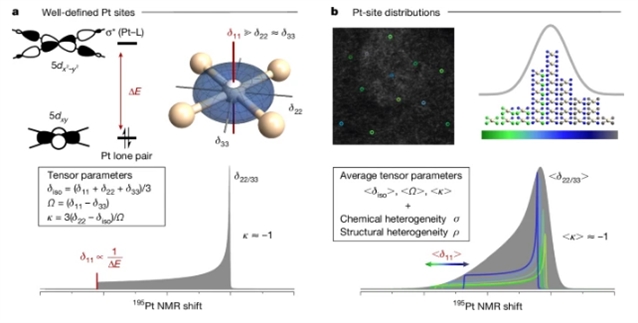
近日,瑞士苏黎世联邦理工学院Christophe Copéret团队研究了Pt单原子催化剂的核磁共振配位环境。相关论文于2025年6月4日发表在《自然》杂志上。
将原子分散物种与受控结构整合在一起的负载型金属催化剂处于催化材料设计的前沿,对反应性和高金属利用率提供了卓越的控制,接近分子系统的精度。然而,准确解决局部金属配位环境仍然具有挑战性,阻碍了优化其设计以适应不同应用所需的结构-活性关系的发展。尽管电子显微镜揭示了原子色散,但在多相催化中使用的传统光谱方法只能提供平均结构信息。
研究组证明195Pt固态核磁共振(NMR)光谱是表征各种载体上原子分散的Pt位点的有力工具,即所谓的单原子催化剂(SACs)。蒙特卡罗模拟允许将NMR光谱转换为SAC特征,以分子精度描述配位环境,从而能够定量评估Pt位点分布和均匀性。这种方法可以跟踪合成参数的影响,揭示特定步骤和支撑类型的影响,还可以监测反应的变化。它为具有目标结构的SAC的可重复开发提供了关键见解。除了SAC之外,这种方法还为研究更复杂的结构奠定了基础,例如含有各种NMR活性金属的双原子或单簇催化剂。
附:英文原文
Title: Coordination environments of Pt single-atom catalysts from NMR signatures
Author: Koppe, Jonas, Yakimov, Alexander V., Gioffr, Domenico, Usteri, Marc-Eduard, Vosegaard, Thomas, Pintacuda, Guido, Lesage, Anne, Pell, Andrew J., Mitchell, Sharon, Prez-Ramrez, Javier, Copret, Christophe
Issue&Volume: 2025-06-04
Abstract: Supported metal catalysts that integrate atomically dispersed species with controlled structures lie at the forefront of catalytic materials design, offering exceptional control over reactivity and high metal utilization, approaching the precision of molecular systems1,2,3. However, accurately resolving the local metal coordination environments remains challenging, hindering the advancement of structure–activity relationships needed to optimize their design for diverse applications1,2. Although electron microscopy reveals atomic dispersion, conventional spectroscopic methods used in heterogeneous catalysis only provide average structural information. Here we demonstrate that 195Pt solid-state nuclear magnetic resonance (NMR) spectroscopy is a powerful tool for characterizing atomically dispersed Pt sites on various supports, so called single-atom catalysts (SACs). Monte Carlo simulations allow the conversion of NMR spectra into SAC signatures that describe coordination environments with molecular precision, enabling quantitative assessment of Pt-site distribution and homogeneity. This methodology can track the influence of synthetic parameters, uncovering the impact of specific steps and support types, and can also monitor changes upon reaction. It offers critical insights for the reproducible development of SACs with targeted structures. Beyond SACs, this approach lays the foundation for studying more complex architectures, such as dual-atom or single-cluster catalysts, containing various NMR-active metals.
DOI: 10.1038/s41586-025-09068-x
Source: https://www.nature.com/articles/s41586-025-09068-x
官方网址:http://www.nature.com/
